Are you looking for an easy way to earn? Look no further! We are hiring for a remote position that allows you to make money right from the comfort of your couch.
Benefits:
Flexible work hours.
Hourly rate of $50-$100/hr.
Fully remote work.
Requirements:
Must be 18 years of age or older.
Must have access to a computer and the internet.
Ability to follow simple instructions.
No prior experience required.
Doesn’t this job advertisement seem like a dream come true?
The promise of high pay for an entry-level position and the freedom to set your own working hours may sound enticing. However, it’s worth noting that 70% of remote job offers like this turn out to be scams.
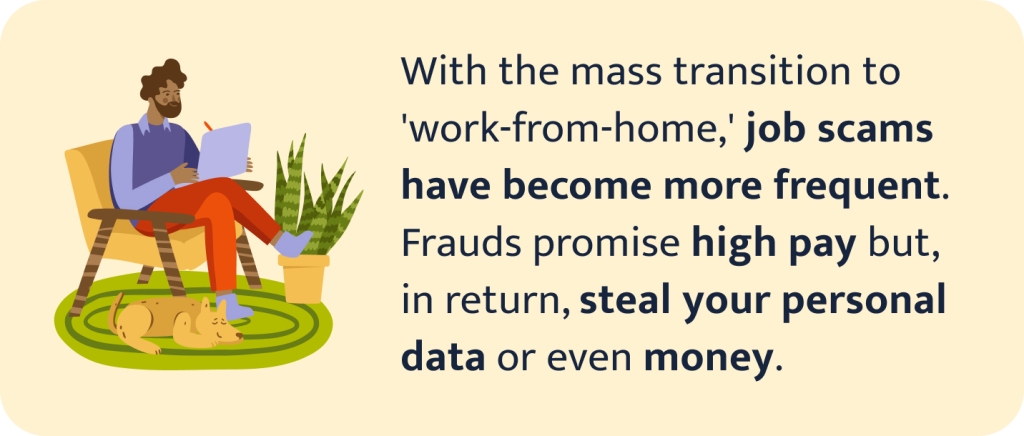
With the surge in remote work following the COVID-19 pandemic, scammers have seized this trend by spreading fake jobs on platforms like LinkedIn, via email, and even through private messages. The anonymity and lack of face-to-face interaction in remote work environments make it easier for scammers to prey on individuals, particularly vulnerable groups such as seniors, adolescents, and job seekers from developing countries.
In this article, our custom writing team will delve into the major warning signs of fraudulent job postings and provide guidance on how to steer clear of falling victim to these scams.
🔢 Remote Work – Quick Facts
In 2024, the UK leads with the highest number of remote workers, followed by the USA, Canada, and New Zealand. As companies worldwide embrace the benefits of working remotely, here are some intriguing facts about this growing trend.
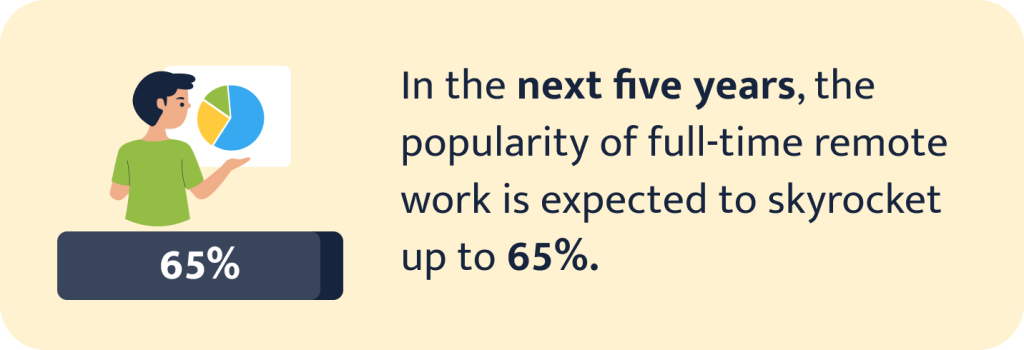
Remote Work Statistics
- There has been a significant explosion in remote workers since 2022, jumping to 27% from just 13% two years earlier. Projections indicate that the popularity of full-time remote work will soar to 65% within the next five years.
- The tech industry stands out as the frontrunner, with nearly 68% of its employees working from home. Following closely behind are the consulting, finance, and insurance industries, with approximately half of their workforce choosing remote jobs.
- Despite the growing popularity of remote job opportunities, a survey revealed that most CEOs worldwide, including 63% in the UK, foresee a complete shift back to traditional office settings by 2026.
The workplace landscape constantly changes, so who knows what surprises the future may bring us?
Most Popular Remote Jobs
What are the most common work-from-home jobs, and how much money they usually offer?
Remote Workers Demographics
A closer examination of remote workers’ demographics reveals many fascinating insights:
- People aged 24-35 are more likely to work remotely. This could be explained by the fact that young people value flexibility and freedom of mobility.
- In terms of gender, more men than women work remotely full-time, comprising 38% versus 30% of women.
- Finally, the majority of employees working from home are highly educated: about 40% of those holding advanced degrees are hybrid or remote workers.
Pros and Cons of Remote Work
Working from home offers various advantages, such as minimizing commute time, but it also presents particular challenges that should not be overlooked. Here are the main pros and cons based on remote workers’ experience.
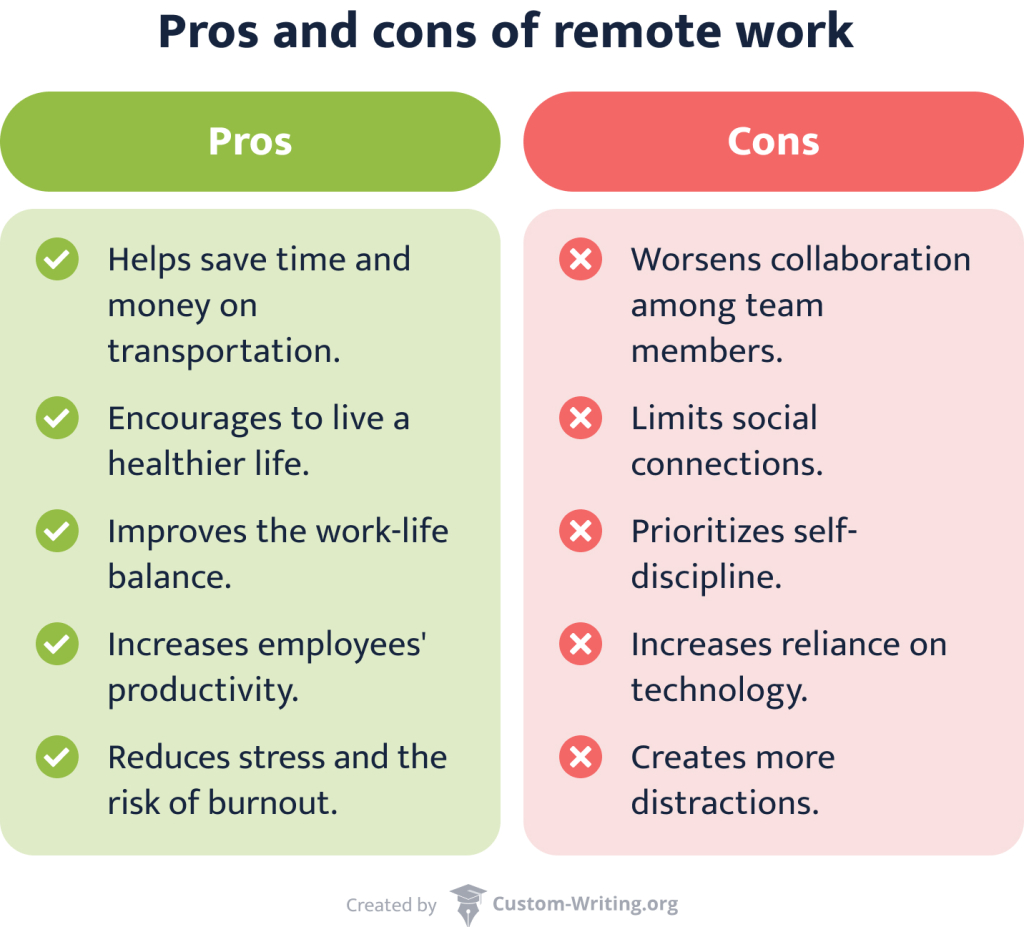
Pros of remote work:
- Saves both time and money on transportation.
- Encourages employees to live healthier lives.
- Improves work-life balance.
- Increases employee productivity.
- Reduces daily stress.
Cons of remote work:
- Decreases collaboration among team members.
- Limits social interactions.
- Heightens the importance of self-discipline.
- Increases reliance on technology.
- Creates more distractions.
☠️ What Is the Work-at-Home Scam?
Many scammers take advantage of people who are looking for work-from-home jobs. Usually, these scammers offer fantastic benefits and salaries to entice job seekers. The main goal of work-from-home job scams is to persuade people to send money or steal personally identifiable information. The number of job scams is truly overwhelming.
According to the FBI’s Internet Crime Complaint Center, they received 16,879 appeals with overall losses of $62,314,015 in 2020. And the numbers are forecasted to increase.
Job Scam Risk Groups
So, who do the job scammers target? From 2017-2020, the most prominent complaints were from young people aged 25-34 (28,2%). Notably, the least amount of complaints, 4.42%, comes from elderly victims aged 65 and over.
But they are still vulnerable targets for scammers. And here is why.
The median loss among seniors was the highest – $2,299 – compared to other groups.
The difference between the number of complaints and the median loss can be explained by the smaller number of working elderly individuals in general. Although rare, the elderly population loses the most due to their lack of familiarity with technology and online financial safety.
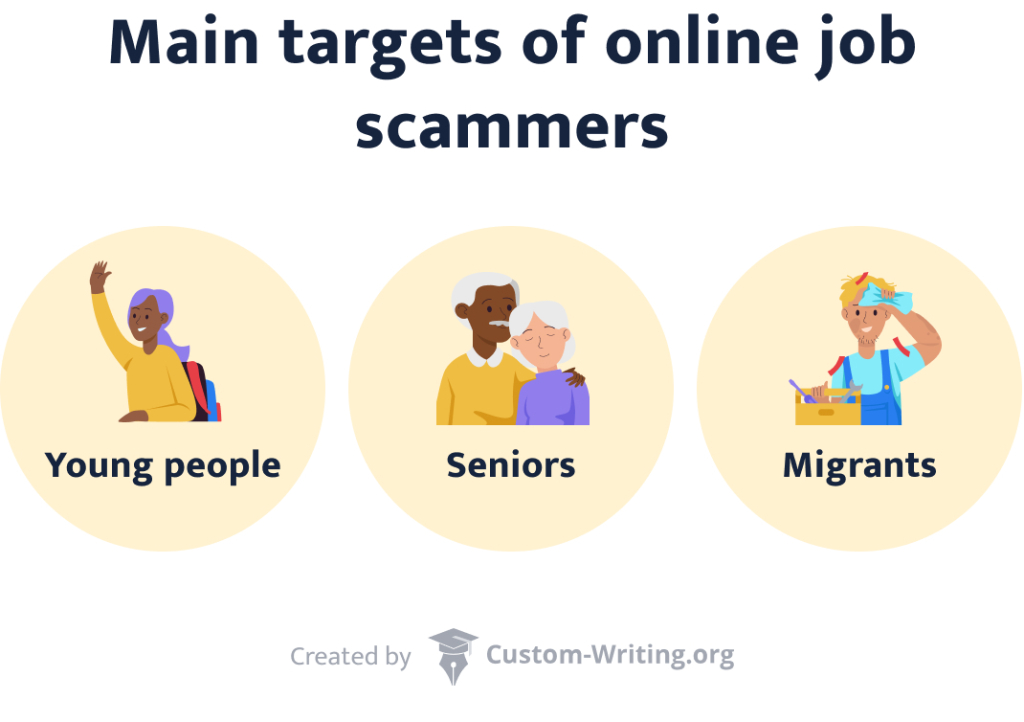
Most Common Forms of Remote Work Scams
Remote work scams come in many forms, with scammers’ tactics constantly evolving. Here are some of the most common remote job scams to be aware of:
- Reshipping or reselling. During the busy holiday seasons, scammers advertise job opportunities where individuals will receive packages and then send them to a different address. The problem is these products have been purchased with stolen credit cards. Therefore, one becomes an accomplice to a felony crime by engaging in such an activity.
- Fake mystery shopping. Scammers offer payment for shopping and sharing the experience. They often send fake checks or require you to pay to start the job.
- MLM. While some multi-level marketing (MLM) jobs are legitimate, scammers operate as pyramid schemes, promising suspiciously high earnings.
- Starting your own business. Fraudulent schemes involve fake business coaching or pyramid schemes. Individuals are asked to buy useless things or recruit other “business owners” alike.
- Medical billing or data entry. Scammers may sell fake training programs or request personal details for identity theft.
- Virtual assistance. A supposed employer sends money for some purchases but then asks to return some funds using a wire transfer or a specific app. Once the employee returns the money, the initial amount pops up, leaving the victim with financial losses.
- False job offers. Scammers pose as recruiters, conducting fake interviews and gathering personal and financial information under the guise of job placement. As a result, people fall victim to identity theft and counterfeit checks.
🚩 The Biggest Red Flags of Fake Job Listings
At first glance, distinguishing between real and fake job offerings can be challenging. We recommend paying attention to certain red flags when exploring your job opportunities.
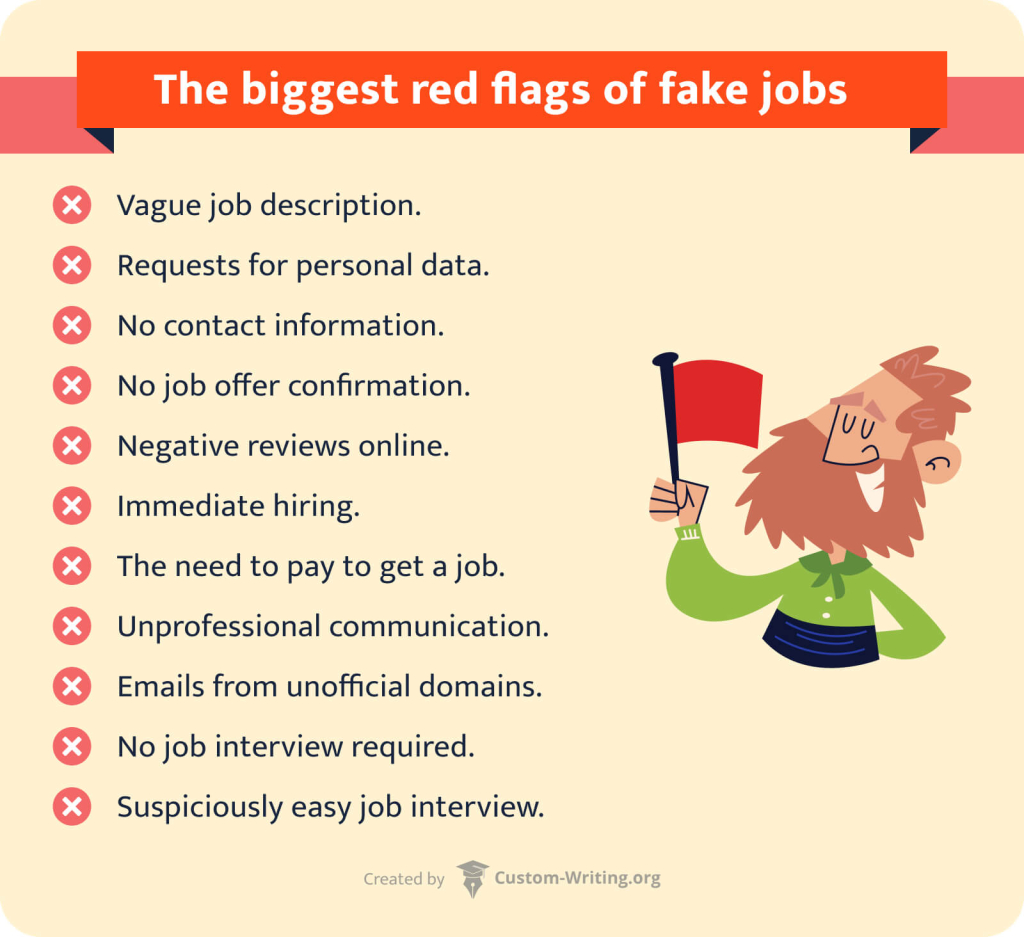
The Job Is Too Good to Be True
If a job offer that seems unbelievably good, it’s probably fake. For example, when a company offers exceptionally high pay for an entry-level position with no experience or skills, it should be perceived with skepticism.
Vague Job Descriptions
Another red flag is when a job description lacks precise details about the responsibilities and requirements of the position. Usually, scammers use this tactic to cast a wider net for potential victims.
The Employer Asks for Your Personal Information
During the application stage, legitimate employers do not request your social security number, bank account number, credit card information, or other confidential data. If a recruiter asks for such information before onboarding, it is likely a scam.
Little Is Known about the Company
Legitimate companies typically have a website and active social media accounts. If you research a company and find no online presence, it’s advisable to seek out other job opportunities.
The Company Has No Verifiable Contact Information
While many companies prioritize their digital presence, legitimate ones still provide verifiable contact information, including phone number, address, email. Lack of such details may indicate a potential scam.
Only One Contact Can Confirm the Job Offer
If you’re interested in a job offer, it’s wise to reach out to someone from the company. Instead of relying solely on contacts provided by the employer, try to find a second contact independently, as many scammers operate in teams.
There Are Complaints Online
Don’t underestimate the power of a simple Google search. Look up the company to uncover any complaints or poor reviews from other candidates. This can provide valuable insight into the company’s reputation.
The Employer Insists on Hiring You Immediately
Be cautious if a recruiter pushes for immediate hiring. Legitimate employers are typically occupied with their responsibilities and may not respond to you instantly.
The Employer Asks You to Pay to Start Working
If you’re asked to pay for training courses or materials, it’s likely a scam. Reputable companies invest in their employee’s development and do not charge fees for employment.
The Employer’s Communication Is Lacking
While occasional mistakes are understandable, pay attention to the professionalism of the employer’s communication. Numerous grammatical errors, spelling mistakes, or inconsistencies in information could indicate a potential scam.
The Employer Uses Only Messengers for Communication
Legitimate employers usually initiate contact through professional platforms like LinkedIn and conduct interviews via video conferencing tools such as Zoom. If all communication occurs solely through messaging apps like WhatsApp, it may be a red flag for a scam.
Emails Are Sent from Non-Official Domains
Legitimate companies typically use official email addresses associated with their company domain (support@custom-writing.org). Beware of emails from generic providers like gmail.com or yahoo.com, as they may not be genuine.
The Employer Offers You a Job Without an Interview
While it may seem appealing to bypass formal procedures, the interview serves as a standard professional practice for both you and the recruiter to decide how well your skills align with the position. Receiving a job offer without an interview should raise concerns.
The Job Interview Is Too Easy
A reputable company will always take the time to interview promising candidates and evaluate their qualifications. If the interview appears unprepared or lacks challenging questions, it may indicate that the job is not real.
Unusual Working Hours with No Explanation
Legitimate employers typically provide reasons for remote or nighttime work requirements. If the employer fails to provide a valid explanation for these unusual hours, it could be a red flag for a job scam.
🔐 How to Secure Yourself from Job Scams
In the following section, we’ll delve into key measures you can take to protect yourself and avoid falling victim to work-from-home scams.
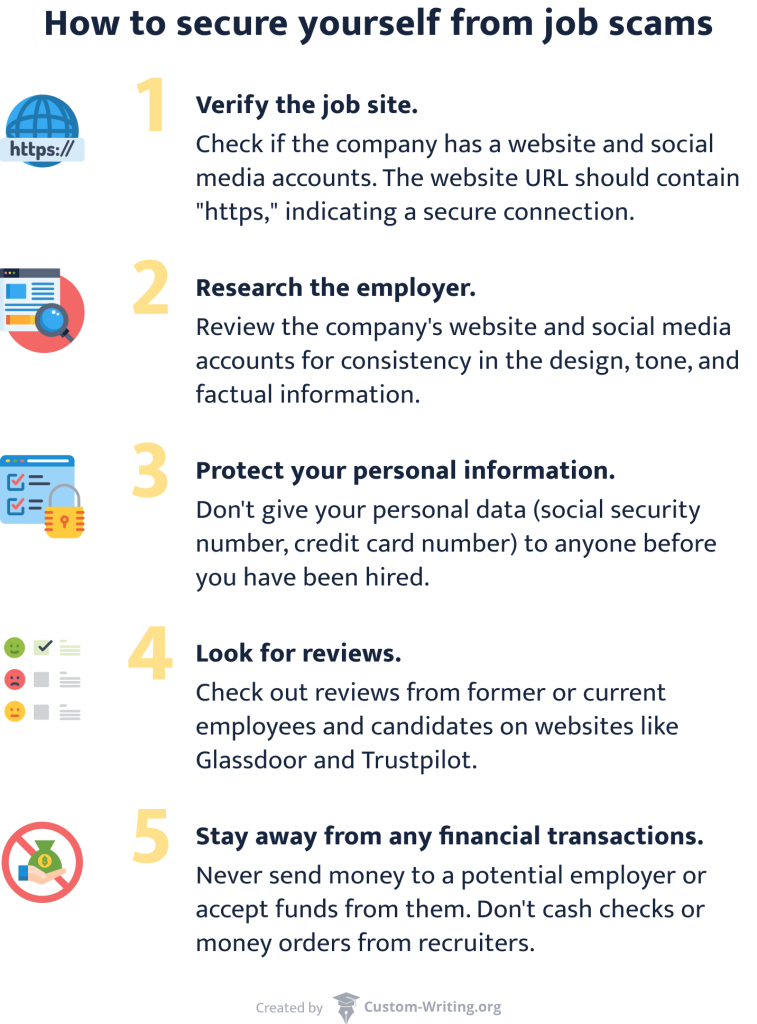
Verify the Job Site
Take your time to research the company and check if it has a website and social media accounts. This is the first step to confirm that the job offer actually exists. Another tip is to see if the company’s website has a padlock with HTTPS, indicating secure communication between you and the server. To explore the digital certificate of the website, in the Google browser, click on the padlock in the web address bar and choose “Certificate.”
Research the Employer
If the company has a website and social media presence, you can make use of this information. For example, take advantage of the contact details and ask some questions through online chat, email, or phone. Another tip is to compare the company’s LinkedIn profile with its website’s design and tone. Finally, check for reviews from employees and clients, as well as comments under social media posts.
Protect Your Personal Information
Remember that all sensitive data, such as your bank account information, social security number, or credit card number, should be protected from strangers online. Trustworthy employers will never request your financial information until they have hired you. Don’t enter your personal data into any online web forms from recruiters.
Look for Reviews
Carefully examine job sites with reviews from employees and candidates. Websites like Glassdoor and Trustpilot provide a safe space for former and current employees to share their experiences with a company. In addition, to get real-time feedback on the company’s practices, you can check its social media platforms, posts from employees and customers, and comments.
Stay away from Any Financial Transactions
Beware of scams involving fake checks from potential employers. Never cash checks that include extra money or instructions to return part of the funds or buy gift cards. If you cash a fake check, it will bounce, and you will be responsible for repaying the bank. Do not accept cashier’s checks or money orders as payment, and never wire funds to a potential employer.
📌 Taking Action against Job Scammers
In 2026, remote work scammers have developed new tricks and increasingly sophisticated methods of deception, putting individuals at risk of even bigger financial losses. If you find yourself a victim of such a scam, follow these steps to minimize the impact of this unfortunate experience.
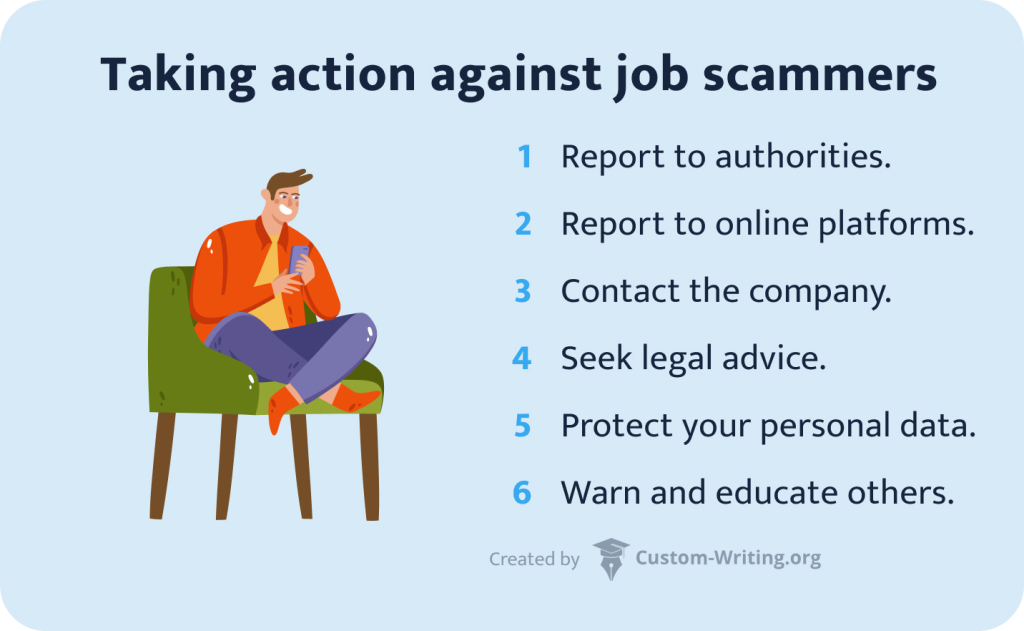
Report to Authorities
After identifying a job scam, the first step is to report it to the relevant authorities. You can contact one of the following organizations:
- the Better Business Bureau;
- the Internet Crime Complaint Center;
- the State Attorney General’s Office.
Provide as much information as possible, including the employer’s contact details, the name of the employer and the company, your communication history, and any evidence of the fraud. The more information you provide, the sooner authorities will take action against scammers and protect potential victims.
Report to Online Platforms
After reporting the scam to the authorities, you should inform the website where you found the fraudulent job offer. Scammers often use LinkedIn or Indeed.com to post fake remote job opportunities, so it’s essential to notify these platforms as soon as possible. You can reach out to them through email or special forms, providing details about fake job postings.
Contact the Company
Another important step is to inform the legitimate company whose brand or name was used by the scammers. It will help the company to protect its reputation, customers, and potential job applicants. You can contact the company through their website, customer service contact, or social media platforms. Provide them with details about the fake job offer, the platform where you found the post, and your communication history with scammers.
Seek Legal Advice
If you have experienced financial losses because of a remote job scam, we recommend seeking legal advice from a qualified professional. A lawyer can help you assess your situation and guide you through the legal process of seeking compensation or justice. Consider finding a lawyer with experience handling fraud cases or online scams.
Protect Your Personal Information
In case you have shared any bank information with scammers, immediately notify your bank about the potential security breach. They can help detect any suspicious activity and freeze your accounts if necessary. If you suspect your passwords might have been stolen, change them in all your online accounts, including email and social media. To add an extra level of security, enable two-factor authentication.
Warn & Educate Others
To prevent other people from falling into the remote work scam trap, you can share your experience on social media platforms, leave a review on career search websites, or make a post on a remote work forum. Spreading awareness about remote job scams is key to safeguarding yourself and others.
However, if there’s a legal investigation in process, it’s better to consult with authorities to understand what information can and cannot be shared.
✅ Scam Job Test – Check Yourself
Are you ready to put your skills to the test and distinguish between real job opportunities and potential scams? Compare these two job descriptions. Can you tell which one is a fraud?
#1. Freelance writer – a high-paying job for you!
We are a fast-growing content creation company seeking freelance writers to join our team.
- No experience necessary – just a passion for writing and the desire to earn big money!
- Our writers have the opportunity to earn up to $1000 per article, with bonuses for meeting deadlines.
- Work from home and set your own schedule – no more 9-5 grind!
To apply, contact our recruiter via this WhatsApp channel!
#2. Freelance writer – lifestyle blog content creation.
We are a reputable lifestyle blog seeking experienced freelance writers to contribute engaging articles on topics such as travel, food, fashion, and wellness.
- Our ideal candidate has a strong writing background and research skills.
- Writers will be responsible for pitching article ideas and delivering polished articles on deadline.
- Our writers typically work around 4-6 hours a day, depending on their availability and the complexity of the article.
- Compensation for our writers is based on experience and the complexity of the article. On average, our writers earn between $0.10 to $0.20 per word.
To apply, send your resume via email below and complete a quick writing test.
Answer: Hopefully, you can tell that the first job description is a scam. Not only does it offer high pay rates that seem too good to be true ($1000 per article), but it also requires no previous experience. No information about the company or occupation was given. Finally, the potential employer insists on further communication via messenger, which is also a red flag.
#1. Work whenever you want!
Are you looking for a work-from-home opportunity with flexible hours and great pay? We need a virtual assistant to join our team and help us with various administrative tasks. No experience is required. For a small fee of $99, you can access our exclusive training program and then earn up to $500 per week!
#2. Virtual assistant for digital marketing services.
Our company is a leading provider of digital marketing services, specializing in helping businesses increase their online presence. We’re looking for a virtual assistant to join our team.
Responsibilities:
- Perform various administrative tasks, including data entry, email management, and social media posting.
- Assist with scheduling appointments and managing calendars.
Requirements:
- Strong organizational and time management skills.
- Proficiency in Microsoft Office and other relevant software.
Answer: Once again, the first remote job description is a fraud. The biggest red flag is that the company asks you to pay for training. Remember that no legitimate employer will ask you for donations to hire you.
#1. Secret shopper
Position: Secret Shopper
Location: Various locations
Salary: Varies based on assignments
Company Y is a reputable market research firm looking for experienced mystery shoppers to join our team. As a mystery shopper, you will visit assigned locations and evaluate the customer service experience.
Responsibilities:
- Conduct mystery shopping visits at designated locations.
- Evaluate customer service, cleanliness, and overall experience.
- Provide detailed reports and feedback promptly.
Requirements:
- Previous mystery shopping experience preferred.
- Reliable transportation and access to a computer/smartphone.
- Ability to follow instructions and meet deadlines.
To apply, please visit our website at www.companyX.com/careers and submit an application along with a sample mystery shopping report.
#2. Mystery shopper
Position: Mystery Shopper
Location: Remote
Salary: $500/week
Our company is seeking individuals to join our mystery shopping team. As a mystery shopper, you will evaluate the customer service and overall experience at various retail stores and restaurants.
Requirements:
- Must be 18 years or older.
To apply, please send your CV to anna_the_recruiter@gmail.com with the subject line “Mystery Shopper Application.”
Answer: Even though we made this one really tricky, we hope you can tell that the fake job posting is the second one. Firstly, it lacks specific details about the company, such as its name, website, and contact information. If you’re a true detective, you must have noticed that the employer asks to send a resume to a generic email address, which raises concerns.
Remote job scams are a prevalent issue today, and anyone can fall victim to these deceptive schemes. However, this doesn’t mean that you should avoid pursuing a remote job. You can successfully distinguish between real job opportunities and scams by being skeptical of red flags such as overly high salaries, vague job details, lack of company information, absence of a social media presence, or negative reviews. It is essential to trust your intuition and do in-depth research.
If you get trapped in a remote job fraud, it’s important not to feel ashamed or embarrassed. Scammers are becoming more sophisticated in their tactics, and it can happen to anyone. It’s crucial to report the scam to the authorities not only to seek justice for yourself but also to protect other people.
If you liked the article, please share it with your friends to raise awareness about remote job scams.
You might also be interested in:
- Communication Essentials for Career Development & Everyday Life
- Building a Job-Winning Resume
- Getting the Most out of Career Fairs [The Complete Guide]
- Changing Career Paths after Graduation… or Later [Guide + Infographic]
- Unexpected Career Tips from Celebrities [2026 Edition]
- 7 Affordable Hobbies You Can Monetize
- How to Make a Resume: Secrets Your Employer Won’t Tell You
🔗 References
- Identifying Fraudulent Employers and Job Scams: University of Michigan
- Recognize & Avoid Job Scams: University of Colorado Boulder
- 17 Common Job Scams and How to Protect Yourself: Indeed
- Avoid Online Job Scams with These 7 Simple Tips: PCMag
- How to Avoid Work-From-Home Job Scams: FlexJobs
- 20 Common Job Search Scams and How to Protect Yourself: FlexJobs
- 5 Common Work-From-Home Scams (And How to Spot Them): Indeed
- State of Remote Work 2023: Buffer
- The Remote Work Scam That’s Blowing up in the Recruiting Industry: Technical.ly
- 9 Tips to Avoid Remote Work from Home Scams: Tech.co
- Searching for a Remote Job? Watch out for Scammers: WJAR
- Avoiding Job Scams: The University of Tampa
- Unexpected Student Job Offers Are Often Scams: University at Buffalo
- Job Scams Are on the Rise: 5 Red Flags to Watch for: The University of North Carolina at Chapel Hill
- Job Scams: UC Davis
- Don’t Fall for Fake Student Job Postings: Indiana University of Pennsylvania
- Job Scams & How to Avoid Them: New York University
- Fake Job Scams Are Becoming More Common—Here’s How to Protect Yourself: Forbes
- Fake Job Postings Are Stealing Applicants’ Money and Identities: The Washington Post
- Common Jobs Scams and How to Avoid Them: Money
- Fake Job Listings Are a Growing Problem in the Labor Market: CBS News

![Quieting Your Inner Critic – Self-Compassion and Other Methods [Guide for Students]](https://custom-writing.org/blog/wp-content/uploads/2024/03/side-view-woman-looking-up-1-284x153.jpg)









![How to Organize a Successful Study Group [GUIDE]](https://custom-writing.org/blog/wp-content/uploads/2023/04/doing-homework-together-1-284x153.jpg)